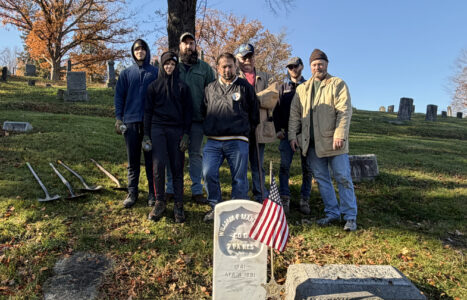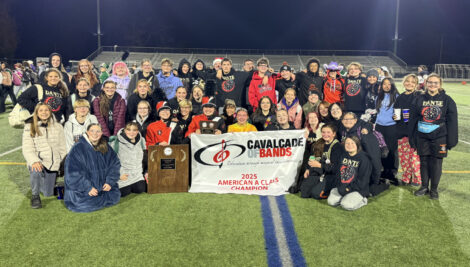Vet 2 Vet panel brings resources to community
WILLIAMSPORT — Pennsylvania College of Technology hosted “Let’s Talk, Vet 2 Vet,” recently. Organized by the Pennsylvania Department of Military and Veterans Affairs (DMVA), the event was a veteran resource fair, with participation from a number of organizations, including STEP, Veterans Crisis Line, and county, state and local veterans affairs offices.
Following the fair, Samantha Cossman, DMVA Regional Program Outreach Coordinator, moderated a seven-member panel that discussed a variety of the most pressing issues for veterans and their families.
Some topics of conversation at the panel included how veterans apply for and how to receive benefits, who is eligible to receive benefits, funding that is available and veterans programs in the community.
Jeff Croak, an officer with Clinton County Veterans Services, explained “at the county office, we work hand in hand with a state and federal VA to help veterans apply for benefits, whether it be disability compensation, healthcare, educational benefits, real estate tax exemptions and the list goes on and on. We would be your primary stop. If we can’t do it for you, we can at least point you in the right direction.”
“As veteran service officers (VSO), we’re accredited by the VA to act on veteran’s behalf,” Mike McMunn, Lycoming County Director of Veterans Affairs, added. “That means if a veteran has been injured or has a disease or disability that was incurred during their service, we can file claims for them, follow up on the claims, and if a claim is denied, we can file appeals.”
According to Chip Gilliland, chief of the Division of Reintegration and Outreach for the DMVA, every Veteran Service Officer has to be accredited. Accreditation through the office of general counsel from the federal VA is essentially a “license to assist veterans.”
The license requirements include a 40-hour block of instruction and 16 hours of continuing education every year to maintain the license. The VA can also pull accreditation at any time and they will no longer serve as veteran service officers.
The county offices are not bound by geographical locations.
“We have a lot of veterans that live up on the Clinton County border of Jersey Shore, Avis and Antes Fort, and it’s more convenient for them to go up to Lock Haven and get the benefits there, McMunn said.
“And that also goes for states as well,” Croak added. “And, our offices do not charge for any services.”
To get the ball rolling on receiving benefits, even if unsure of veteran status, McMunn says contacting your local Veteran’s Affairs office is best.
“Bring in a DD-214; that’s a passport to veterans benefits. We can look at that and try to determine some degree of eligibility for not just that period of time that they serve(d), maybe medals and awards that they received, to see what eligibility they may have,” he said.
If a veteran or beneficiary would like to inquire about benefits, but does not feel comfortable going through their county office, there are many options still available.
“Since 2007, we’ve had a thing called the Veteran Service Officer grant program, which is a budgeted line item from the state government every year, Gilliland explained.
“We grant funding to up to five organizations here in Pennsylvania, the VFW, American Legion, Disabled American Veterans, American Veterans and the Vietnam Veterans of America. What they do with that funding is hire accredited veteran service officers to go out within the communities and perform outreach, to help people get their benefits. Typically, we average about 65 people who are accredited veteran’s service officers through those organizations. They are a great force multiplier within the state.”
Albert Pritchard, Veterans Benefits Legal Administration specialist, spoke about the Veterans Benefits Administration, which handles all non-health related benefits afforded to veterans.
“Some of them are disability compensation related to a person’s active duty service, and pension for wartime veterans that are extremely low income, it needs to help,” Pritchard said. “A fiduciary program is another program for veterans who are not mentally able or physically able to maintain their own benefits. So the VA or the person in question can appoint somebody to be their fiduciary. Education, GI Bill, any other education related benefits.”
Pritchard also spoke about the veteran Readiness and Employment program which is designed to help get veterans back into the workforce, a loan eligibility and life insurance eligibility programs through the VA and a program through The National Cemetery Administration that will help with costs associated with burial.
There are three ways veterans and families can apply for these benefits. Those interested can apply online, through one of the five service organizations listed above or by submitting a paper application.
A relatively new system for veteran engagement is VEAC.
“VEAC allows veterans to make virtual, or in-person appointments,” Pritchard said. “It’s a very handy system, because when you make this appointment, you’re going to have to designate a time slot. The good thing about the phone call is you don’t have to leave the comfort of your own home. Someone from the regional office will call you and take as much time as necessary to discuss your issue and resolve it.”
Ann Kwiatkowski, Wilkes-Barre VA Medical Center whole health program manager, informed the crowd on what the Whole Health program has to offer.
“This is an approach to care that empowers and equips our patients to take charge of their health and well being and really live their lives to the fullest,” Kwiatkowski said. ” The VA is moving away from disease focused care, to one that focuses on what’s going right in a person’s overall health and wellbeing.”
She added that “personalized, proactive, patient-driven care” is offered through the Whole Health program. She added that there is a passion to “empower our patients for self care.”
Two initiatives the program focuses on include their “mission, aspiration and purpose,” and “Complimentary and Integrative Health.” She added that through the program, veterans are given the tools to work on adding tools into their “regiment of care.”
“I call them our extra tools in our arsenal that our veterans can use in addition to the care that they’re being provided directly from our clinicians,” she added.
According to Mark Askey, Harrisburg Vet Center veteran outreach program specialist, Vet Centers play an important role.
“Vet Centers are community based centers that started in 1979, primarily for Vietnam vets to welcome them home from the battlefield,” Askey said. “The majority of our clientele are folks that suffer from PTSD, and other disorders that would be related to combat. The way it works is a veteran can walk in, and I check them for eligibility, and it’s as easy as that if they have a DD-214 or an NGC-22 for the National Guard reserves. The main eligibility is somebody who served in combat and boots on the ground. It doesn’t matter if it was for a year, a month, or a day, we’ll still be able to get you into VC.”
“One of the other big things that we’re seeing a lot now is military sexual trauma. It’s kind of like the elephant in the room that nobody wants to talk about sometimes. However, there is a conversation to be had, that it is very real amongst both men and women,” Askey added.
“We do see UAV pilots. These are folks that maybe never stepped foot in a combat zone, but sat in a room somewhere here in the States and dropped ordinances in Iraq or Afghanistan. Another big one is for your family and marriage counseling.”
These services are available to the loved ones of veterans who served in combat as well, according to Askey.
“Family therapy and children can come in because no matter how you slice it, it affects the entire family,” Askey said.
One area that may fly under the radar for this service is the National Guard.
“If they were called up by the governor, they can also be seen from us because we treat that just like a deployment because during a natural disaster, there’s some pretty horrific stuff that happens, retrieving bodies, anything traumatic.”
There are currently 13 Vet Centers throughout Pennsylvania, including one in Williamsport.
The Pennsylvania Department of Military and Veterans Affairs offers 15 programs that veterans and their families are eligible for.
“Probably the biggest one that we deal with is a program called real estate tax exemption. They can apply to have their property tax exempt,” Gilliland said. “We don’t grant the exemption; we determine eligibility and then we let the county assessment office know that they are eligible for our program, then it’s up to the county to make that determination.”
Another program available is the Veterans Trust Fund that brings in money through five different avenues, one of them being donations.
If you’ve ever renewed your driver’s license or your vehicle registration, there’s a little checkbox down at the bottom to donate $3 to the veterans Trust Fund. 100%, every penny of that fund goes toward assisting veterans,” Gilliland said.
“First thing is every year we grant funds to 501c3 charitable organizations, veteran organizations and county directors for Veterans Affairs. We rely on 501c3 charitable organizations to do work for us. We provide the funding and then let them do their specialty. And they are very thoroughly vetted before they receive funding,” he added.
Donations can also be made by corporations and private citizens as Gilliland explains, “about six months ago, we had a general walk in the office and gave us a check for $300,000, and he says, ‘you know, I just want to help veterans.’ He was hardly even going to give us his name. About four weeks later, he comes back with $350,000. So in a matter of like three weeks ago $700,000. We spend that money every year helping thousands of veterans.”
Although sometimes not as recognized for their service as the federal military branches, the panel made it a point to discuss benefits available to National Guard troops and their families.
“As a Soldier and Family Readiness specialist, we are stationed in National Guard armories, ” said Lydia Speciale, a family programs specialist with Pennsylvania National Guard. “We serve all branches, and not just those that currently serve, but those who have served in all branches, and their family members.”
Speciale said that there are education benefits, career benefits, as well as rent and mortgage assistance.
“You just have to reach out, there’s 20 of us throughout the state,” Speciale said.
Each county office also has emergency funding that is available, and generally uses a similar eligibility system as the state does.
“If a veteran is in need, or they have unforeseen expenses or loss, we partner with a local charity organization that manages the funding they come in and apply for,” Croak said.
Usually within a couple of days after approval, the veteran or the surviving spouse could receive their funding.
In addition to county veteran office, there is help available through other nonprofits, such as Hometown Heroes, according to McMunn.
“We fund Hometown Heroes through donations, sometimes private, corporate donations, but the biggest sales that we have are the banners that you see down on Via Bella,” McMunn said.
He added that all of the money earned through the banners goes towards the veterans.
Food security can also be a worry for many service members and their families, and Military Share is a free program designed to fill that gap, with Lycoming and Clinton counties each serving between 350 to 400 families.
“Reach out to us and we can get you registered,” Speciale said. “Our military shares come straight from the Central PA food bank.”
Registration is required so the number of meals needed can be requested, and pick up for Lycoming County residents is every third Wednesday of the month at VFW Post 7863 in DuBoistown. Those residing in Clinton County can pick up their packages on the third Thursday of each month at the Castanea picnic grounds. The distribution can be done from the convenience of participant’s vehicles, for an easy, quick process. Those receiving through this program may also make alternate arrangements for pick up if other appointments interfere with pick-up times. They may also designate a proxy to make the pick-up for them.
Due to the large number of families and individuals being served, Military Share is always looking for volunteers to help with distribution days, as well as people interested in donating monetarily.
Croak stressed the need for drivers to be able to transport veterans to and from appointments.
“Drivers are solely volunteer based. So, if anyone is interested in becoming a driver, there’s not many requirements as long as you have a clean driver’s history. You do need to have your own personal vehicle insurance, just in case there is an accident, that way you have your own insurance to cover yourself,” Croak said.
Volunteers are also needed for the Veterans Treatment Court, a program in which veterans navigating the criminal justice system are paired with veteran mentors to help them through this tough time in their lives. Mentors must go through a state police background check, and be veterans, themselves.
“It gives veterans who are involved in the justice system some counseling, and access to the VA,” McMunn said. “The Wilkes Barre VA, for example, has a veteran’s Justice Outreach Program. We try to match them by branch of service, but it depends on how many we have. One of our big needs is to have more mentors. We have an increasing number of veterans who are justice involved. Generally, most of them might be DUI substance abuse offenders.”
Another program discussed is called Soldier For Life.
Following up an audience question about the difficulty of receiving an exit exam, in time for employment outside of the military, Pritchard strongly suggested those with similar issues contact their legislators, stating “as you probably know, the VA doesn’t have any influence on what DOD does. I think the best thing that you could do is get your congressmen or senators involved and have them put pressure on the military.”
Gilliland further suggested those transitioning back to civilian life look into the Soldier For Life program.
“From the day that somebody joins the military they’re put on a track throughout their military career,” Gilliland says, “and now about a year prior to their ETS date, they get lined up for classes, they get lined up for programs. They get lined up for potential employment opportunities. They have apprenticeship programs now that somebody can leave the military six months before their ETS date, go do an apprenticeship program at a business, and possibly get hired into that business. It’s an employment program,” Gilliland continues, “and if you talk to a county VSO, they can point you in those directions. Most of the Careerlinks in Pennsylvania have veteran outreach program managers. So, there’s a lot of resources out there.”
Another audience member lamented the often difficult task of gathering military records of service.
“The VA has a duty to help you gather those records and information to further your claim,” McMunn says. “Sometimes the records are there, but other times, you might have to contact the National Archives in St. Louis and get the records from them. We always encourage a veteran to put their DD 214 on file that their county register,” McMunn continues, “those records are there forever. County Register records are not going to be released to anybody except that veteran and family, or funeral director. So, that’s one of the biggest insurance policies that veterans can take. We have a couple other ways that we try to access the records, but it was difficult, because during COVID, the National Archives in St. Louis was shut down. They had a backlog of almost a million requests. They’ve worked those down, and now it seems that requests are coming through timely.”
Gilliland states that Army or Air National Guard veterans can also contact the DMVA for assistance in getting their military records.
Another audience concern was the existence of businesses that charge veterans for assistance in receiving records or benefits due.
“If somebody runs into those situations,” Gilliland says, “give us a call at the office and let us know. We want to find these organizations because we have a very good veteran advocate in the Attorney General’s Office.”
One of the unique aspects of veterans services in Williamsport is the existence of an I.D. Center at the armory, a feature Speciale says that not all locations have.
Speciale also touts the availability of financial counselors to veterans.
“Personal financial counselors are not just free to the service member,” she says, “but they’re private and confidential. They serve all branches, and can help set you up for financial success if you have questions about your taxes, just setting up a budget, savings, or your current situation, they can go through all that, and be glad to work with you.”
To close out the event, Gilliland offered three takeaways.
“Never pay for veteran services. Second, don’t do claims on your own, get an accredited veteran’s service officer to help you out. Third thing is there are a lot of community resources out there. If you know a veteran or are a veteran yourself, who’s experienced some kind of difficulty, reach out to my team. There has not been one situation yet, in three and a half years, that they haven’t been able to find a solution. So if you’re at wit’s end and can’t find any solutions to help a veteran out, contact these folks, they’ll get it done.”





